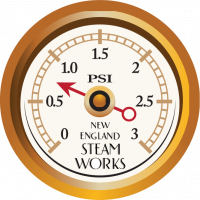Welcome! Here are the website rules, as well as some tips for using this forum.
Need to contact us? Visit https://heatinghelp.com/contact-us/.
Click here to Find a Contractor in your area.
If our community has helped you, please consider making a contribution to support this website. Thanks!
Where's The Venting?
Options

New England SteamWorks
Member Posts: 1,528

Ran into a Hoffman 2-pipe orifice system this past week. Began to scratch my head when I could find no vents, or air eliminator apparatus. No vents on the radiators, no traps, no condensate tank.
Nothing!
Then I found this pipe on the two dry return tees:

And so I followed the piping, through a bulkhead, and discovered this:

Now, I've seen chimney venting before, rather ingenious actually with the draft assist.
But never as the sole means of venting!
Thought you might enjoy.
New England SteamWorks
Service, Installation, & Restoration of Steam Heating Systems
newenglandsteamworks.com
Service, Installation, & Restoration of Steam Heating Systems
newenglandsteamworks.com
0
Comments
-
If orifices are sized right, no steam should make it passed the last section on the radiators.0
-
That, and very low pressure...AMservices said:If orifices are sized right, no steam should make it passed the last section on the radiators.
New England SteamWorks
Service, Installation, & Restoration of Steam Heating Systems
newenglandsteamworks.com1 -
Broomell, VECO and other similar systems vented into the chimney like that. The idea was that the chimney draft would help pull air from the system. See chapter 15 of Lost Art.
But AFAIK this is the first time we've seen a chimney-vented Hoffman. Which components on this system did Hoffman build?All Steamed Up, Inc.
Towson, MD, USA
Steam, Vapor & Hot-Water Heating Specialists
Oil & Gas Burner Service
Consulting0 -
No nomenclature on the orifice elbows that I could see. No 2-pope components in boiler room. Just Hoffman radiator valves through out.New England SteamWorks
Service, Installation, & Restoration of Steam Heating Systems
newenglandsteamworks.com0 -
OK. This is what Gordo and I call a "vernacular" system, in that it was probably the work of a local contractor who went around installing systems his own particular way.
The pattern seems to be that the contractor knew how to build a workable system, and ordered his materials from whatever the local suppliers stocked.
If the Hoffman valves are the #7 type, as used on systems with Differential Loops, it fits the pattern. These valves had orifice shutters built in, so it would have been a simple matter to set the shutters on installation to the point where they only allowed the steam to fill 80% of the radiators. We've seen such systems built with all different makes of valves, and standard union elbows on the radiator return connections.
But this is the first one I know of that was chimney-vented.All Steamed Up, Inc.
Towson, MD, USA
Steam, Vapor & Hot-Water Heating Specialists
Oil & Gas Burner Service
Consulting0 -
Original Mouat systems were chimney vented. We put them back that way still to this day. We do usually put an aquastat on the pipe going to the chimney, in series with the vaporstat just in case.gwgillplumbingandheating.com
Serving Cleveland's eastern suburbs from Cleveland Heights down to Cuyahoga Falls.0 -
Of course the original systems had a continuous fire, so actual significant air removal was a rare event at startup. Ongoing the chimney draft would drop the pressure in the dry return and thereby reduce the pressure required at the header from what it would be with the dry return vented to the atmosphere. A small advantage, yes, but a continuous one and easily worth it.
With intermittent fire, if an open pipe in the chimney from the dry return is the only vent, I assume the system backfills from the chimney between cycles. Fire is off, and the collapsing steam wil surely create a lower pressure in the pipes than is in the chimney.
I have suggested for some time now that very little venting is required in two pipe systems if you simply don't let the air back in. If you don't let air in steam continues to move from the header to the rads the whole time the fire is off between cycles. On refire a very small amount of air needs to be pushed out each cycle at the end of the burn when the vacuum is gone. Makes a huge difference in the performance, really does.1926 1000EDR Mouat 2 pipe vapor system,1957 Bryant Boiler 463,000 BTU input, Natural vacuum operation with single solenoid vent, Custom PLC control0 -
The bigger they are, the harder they fall:

New England SteamWorks
Service, Installation, & Restoration of Steam Heating Systems
newenglandsteamworks.com0 -
But, fall she did. And a new Baby 80 was born:



New England SteamWorks
Service, Installation, & Restoration of Steam Heating Systems
newenglandsteamworks.com0 -
We tried it at first without additional venting, but the chimney venting must be blocked, for it ran up pressure very quickly, long before all the mains were even warm, shutting down on pressure.
So we popped in two Big Mouths, and then she ran perfectly.New England SteamWorks
Service, Installation, & Restoration of Steam Heating Systems
newenglandsteamworks.com1 -
Beautiful install as always @New England SteamWorks.-1
-
Nice work. Pretty in fact.
Miss Hall's School service mechanic, greenhouse manager, teacher, dog walker and designated driver
0 -
Categories
- All Categories
- 87.2K THE MAIN WALL
- 3.2K A-C, Heat Pumps & Refrigeration
- 60 Biomass
- 427 Carbon Monoxide Awareness
- 118 Chimneys & Flues
- 2.1K Domestic Hot Water
- 5.8K Gas Heating
- 113 Geothermal
- 164 Indoor-Air Quality
- 3.7K Oil Heating
- 73 Pipe Deterioration
- 1K Plumbing
- 6.4K Radiant Heating
- 393 Solar
- 15.5K Strictly Steam
- 3.4K Thermostats and Controls
- 56 Water Quality
- 51 Industry Classes
- 49 Job Opportunities
- 18 Recall Announcements





